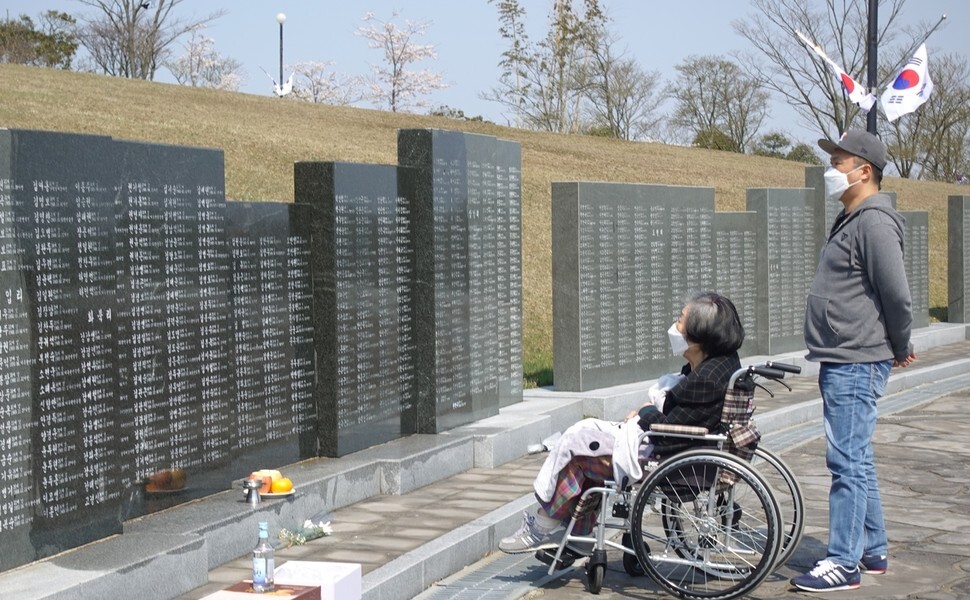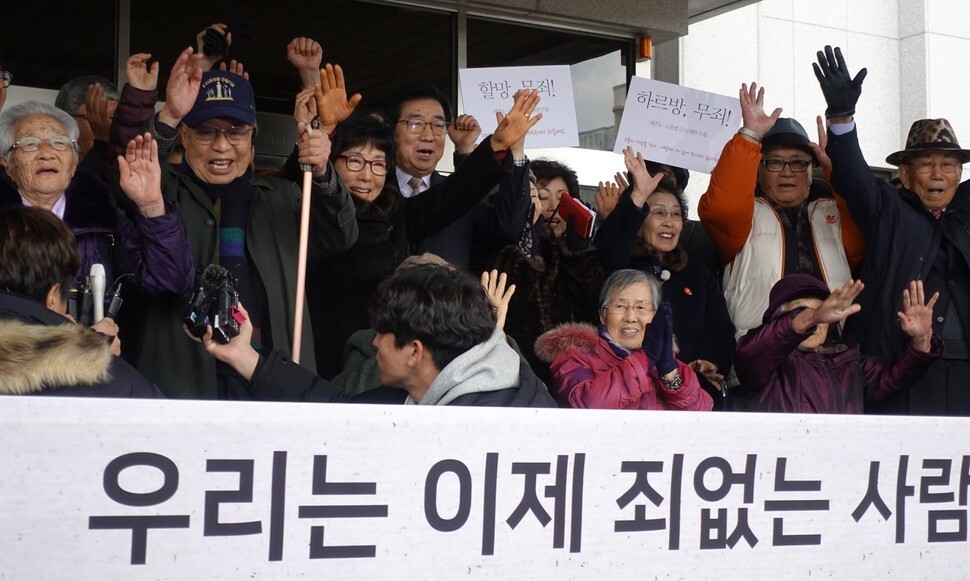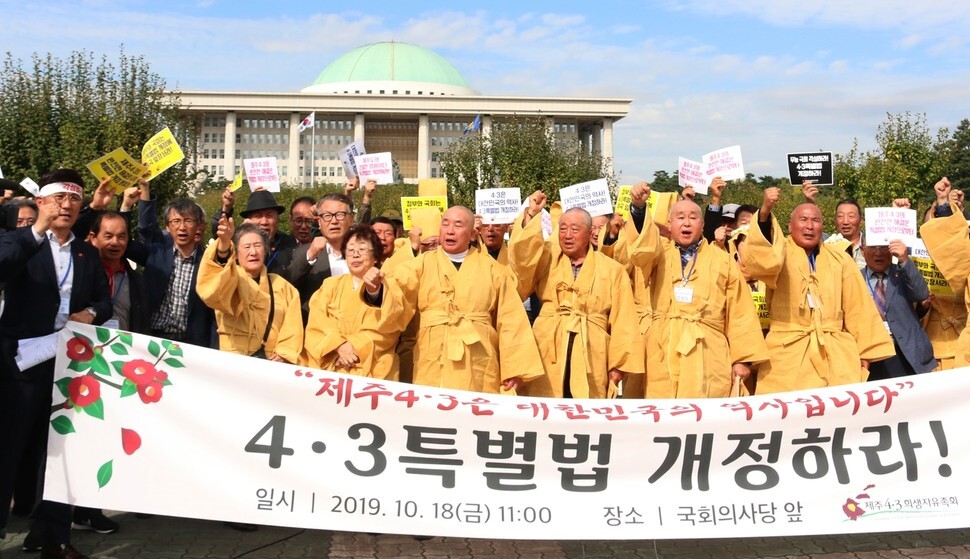hankyoreh
Links to other country sites 다른 나라 사이트 링크
Request for retrial by families of Jeju Massacre victims goes unheard for over 10 months

“Who could fathom the kind of injustice we feel when we can’t even find so much as a bone fragment or know what day they died?”
Kim Pil-mun, a 75-year-old resident of the Yeongpyeong neighborhood of Jeju City, let out a deep sigh. On June 3 of last year, he requested a retrial to overturn a military court-martial verdict against his father Kim Gyeong-haeng, who went missing during the events of the Jeju Massacre, also known as Jeju April 3. Meeting with the Hankyoreh on Mar. 3, Kim voiced his exasperation.
“It’s been 10 months now, and I haven’t heard anything from the court about the trial going forward,” he said.
Kim was three years old when his father was sentenced to 15 years in prison at a military court-martial on Dec. 8, 1948. The elder Kim was taken to Daegu Prison, after which there was no further word about him. Kim Pil-mun has no idea why or how his father was taken. All he heard from his mother was that the family had moved into the city when their hillside village was forcibly evacuated, and that his father was captured there by police, subjected to torture with electric shocks, and held at an alcohol factory before being taken to Daegu Prison and falling completely off the radar.
“The people who came back alive from prison were exonerated last year and even received compensation from the state. What about the people like me, whose fathers never returned?” he asked.
Explaining his reasons for requesting a retrial, Kim said, “I want information about whether it’s possible to even have military court-martials against civilians and whether the trials were conducted properly.”
“My priority is to restore my father’s good name,” he added.
Kim was among fully 379 people who have requested court retrials to exonerate their family members or themselves. The only result, however, has been a ruling in January 2019, in which 18 surviving prisoners who requested a retrial in April 2017 were acquitted and awarded state compensation.
No progress has been made in discussions on the matter of the state compensation for Jeju April 3 victims. The only mention has been in a meeting of the legislation review subcommittee of the National Assembly Public Administration and Security Committee on Apr. 1, where Democratic Party lawmaker Oh Young-hun observed, “The only law where there hasn’t been compensation despite individuals being determined by the Republic of Korea government to have been victimized concerns victims according to the Special Jeju April 3 Act,” while fellow Democratic Party lawmaker Kang Chang-il insisted that “compensation must be provided by the National Assembly through legislation in the interest of social justice.”

Family members of Jeju April 3 victims and related groups agreed that that the Special Jeju April 3 Act needs to be amended to address the compensation of victims and surviving family members and the stream of retrial requests. But despite the Moon Jae-in administration’s inclusion of a “full resolution of Jeju April 3” among its top 100 governance tasks and pledges by politicians to amend the Special Jeju April 3 Act at every commemorative ceremony held for the incident, no actual changes have taken place. Five amendments to the act have been presented during the 20th National Assembly, but only twice -- in September 2018 and April 2019 -- has the matter been addressed by the Public Administration and Security Committee’s legislation review subcommittee.
Vice Minister of the Interior and Safety Yoon Jong-in shared a negative perspective on the matter of nullifying military court-martial rulings at a meeting of that subcommittee in April of last year.
“The opinion of the Ministry of Justice is that this requires a prudent approach due to concerns about infringing on the rights and legal soundness of the judiciary, and that the matter should be resolved through trial procedures by expanding the grounds for the decision to hold a retrial,” he said at the time.
“The Ministry of the Interior and Safety’s position is that the matter should be decided through legislation and policy, with the concerns about infringing upon the judiciary’s rights weighed against the need to restore dignity,” he added. On the matter of compensation, he only said, “It is being discussed with financial authorities.”

An “Additional Investigation Report” published by the Jeju 4/3 Peace Foundation argued, “If the first stage in enacting the Special Jeju April 3 Act was about investigating, restoring reputations, a state apology, and state remembrance of the dead, then now is the time for proceeding into stage two of recovering from the losses through state compensation and the practice of justice.”
“Whenever there’s a Jeju April 3 commemoration ceremony, politicians and the government pledge to focus their energies on resolving the Jeju April 3 issue, but we aren’t seeing any headway being made,” said Song Seung-moon, chairperson of the Association for the Bereaved Families of 4/3 Victims.
“If the government and politicians are committed, they should pass an amendment to the Special Jeju April 3 Act during the 20th National Assembly,” he insisted.
Heo Young-sun, director of the Jeju 4/3 Research Institute, said, “Jeju April 3 is seen as a model instance of the campaign to reckon with historical issues and has gone through many different stages in terms of investigations and restoring dignity.”
“When the government and politicians’ responsibility for resolving the matters of Jeju April 3 are realized through actions rather than slogans, then a movement of reconciliation, coexistence, and inclusiveness for Jeju residents can also blossom,” she predicted.
By Huh Ho-joon, Jeju correspondent
Please direct comments or questions to [english@hani.co.kr]

Editorial・opinion
![[Editorial] Penalties for airing allegations against Korea’s first lady endanger free press [Editorial] Penalties for airing allegations against Korea’s first lady endanger free press](https://flexible.img.hani.co.kr/flexible/normal/500/300/imgdb/original/2024/0502/1817146398095106.jpg) [Editorial] Penalties for airing allegations against Korea’s first lady endanger free press
[Editorial] Penalties for airing allegations against Korea’s first lady endanger free press![[Editorial] Yoon must halt procurement of SM-3 interceptor missiles [Editorial] Yoon must halt procurement of SM-3 interceptor missiles](https://flexible.img.hani.co.kr/flexible/normal/500/300/imgdb/child/2024/0501/17145495551605_1717145495195344.jpg) [Editorial] Yoon must halt procurement of SM-3 interceptor missiles
[Editorial] Yoon must halt procurement of SM-3 interceptor missiles- [Guest essay] Maybe Korea’s rapid population decline is an opportunity, not a crisis
- [Column] Can Yoon steer diplomacy with Russia, China back on track?
- [Column] Season 2 of special prosecutor probe may be coming to Korea soon
- [Column] Park Geun-hye déjà vu in Yoon Suk-yeol
- [Editorial] New weight of N. Korea’s nuclear threats makes dialogue all the more urgent
- [Guest essay] The real reason Korea’s new right wants to dub Rhee a founding father
- [Column] ‘Choson’: Is it time we start referring to N. Korea in its own terms?
- [Editorial] Japan’s rewriting of history with Korea has gone too far
Most viewed articles
- 160% of young Koreans see no need to have kids after marriage
- 2Months and months of overdue wages are pushing migrant workers in Korea into debt
- 3Presidential office warns of veto in response to opposition passing special counsel probe act
- 4[Editorial] Penalties for airing allegations against Korea’s first lady endanger free press
- 5Hybe-Ador dispute shines light on pervasive issues behind K-pop’s tidy facade
- 6Historic court ruling recognizes Korean state culpability for massacre in Vietnam
- 7Japan says it’s not pressuring Naver to sell Line, but Korean insiders say otherwise
- 8Story of massacre victim’s court victory could open minds of Vietnamese to Korea, says documentarian
- 9Historic verdict on Korean culpability for Vietnam War massacres now available in English, Vietnames
- 10Bills for Itaewon crush inquiry, special counsel probe into Marine’s death pass National Assembly